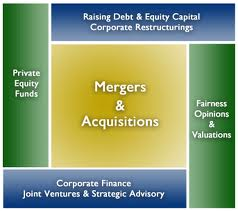HEAD TO HEAD: CONSULTING VERSUS INVESTMENT BANKING

Jide, ex-KPMG, ex-Vetiva, ex-Renaissance Capital, is the Sub Saharan African Markets Risk & Financial Services Leader of Talentstone Africa Partners. He’s a 2005 graduate of Obafemi Awolowo University, Ile Ife, Nigeria.
Investment banking and strategy consulting are like Antigua and the Grenadines: both attract the elite (or at “insecure, deeply left-brain, hyper-intellectual, OCD over-achievers,” in the words of one ex-McKinsey director). If you want to get in you’ll need a sack stuffed with academic achievements and accolades and a résumé filled with the right sorts of extracurricular activities. And as both investment banker and consultant you’ll be paid well, will operate at the ‘highest levels’ and will work considerably more hours than your friends in other industries.
This is not to say that banking and consulting are equivalent careers though. Like Antigua and the Grenadines, they have their differences. And those differences are fairly substantial. If you’re toying with a career in consulting or a career in banking, here’s how to decide which is best for you.
Investment Banking pays more, especially in the short term.
The London Business School sends around 32% of its MBA graduates into strategy consulting and around 28% of its MBA graduates into finance. Helpfully, it records just how much its MBAs earn in those sectors. Guess what? Finance pays more – especially when it comes to the year-end bonus.
However, one ex-McKinsey consultant who now works in investment banking says that if you play a long game in consulting, you’re likely to come out on top of the bankers. Sure – in the first ten years of your consulting career, he says you’d almost certainly earn more as a banker. “But once you reach MD-level in an investment bank, compensation starts to plateau,” he tells us. “In banking, you can be subject to volatility, both from the market and personal performance.
Meanwhile, consultants are on a consistent trend upwards.” While banking pay is plateauing, he says compensation at places like McKinsey only really kicks in at the senior partner level: “Take median compensation 15-20 year veterans, and I bet consultants at McKinsey or BCG would come out on top of bankers.” This may be true: senior partners in consulting firms earn $1m+.
But you’re less likely to lose your job in consulting.
This brings us to the second point: job security. Your chances of having a 15-20 year career in consulting look a lot higher than your chances of having a 15-20 year career in banking. Take McKinsey & Co. Between 1994 and 2001, it went from 3,300 consultants globally to 7,700. As of December 2014, it had 19,000 staff globally, or which around 9,000+ were consultants. In other words, headcount in consulting just seems to rise and rise. While firms like McKinsey and Boston Consulting Group are quick to advocate cost cutting in other industries, their own staff seem fairly secure.
Investment banking headcount has a tendency to oscillate wildly and is on a long term downwards trajectory in major financial cities. However, guess who helps banks deal with the cost and regulatory pressures that make them cut people? That’s right, consultants. Even when banking jobs are being cut, consultants still have plenty to get on with. Banking therefore looks like the more risky career option – You might get paid more, but it might not last.
The hours are longer in banking, but in consulting you’ll often be away from home during the week.
The hours you work in banking will depend upon the area you go into. If you go into sales and trading you can expect very early mornings but clearly defined ends to your day as markets close. If you go into IBD (M&A or capital markets), the hours are much more protean: 100 hour working weeks are not unheard of, and non-banking friends tend to fade away as weekends and holidaysare consumed by the demands of the job. The hours are tough in consulting too. Don’t forget that if you work as a consultant you can spend your weeks ‘on the road’ (see below), miles away from home.
The ex-consultant we spoke to said weeknights are often a killer in consulting jobs – you’re lucky to get in by 10pm. Unlike in IBD, however, consulting work rarely impinges upon the weekend. Banks are trying to address the hours issue. Credit Suisse, Bank of America, Goldman Sachs and JPMorgan are among those to have introduced policies ensuring that IBD bankers get some weekend time off every month. They’re also taking on more juniors so that the people they do hire don’t have to work so hard. Bank of America, for example, is said to have hired 40% more analysts and associates in 2014 than it did the year before.
Consultancy firms are alert to the hours issue too. Boston Consulting Group has been implementing a policy known as ‘Predictable Time Off’ for the past five years. Under this policy, consultants at the firm are assigned ‘predictable periods’ of downtime at the start of a project. During these periods, BCG consultants are required to be off completely – they mustn’t check their email and they mustn’t check their voicemail. Meanwhile, McKinsey & Co introduced flexible work programmes a few years ago (as detailed in this report) – employees there can now take blocks of unpaid leave between projects, work three or four days a week, or take a leave of absence for up to a year.
The consulting lifestyle can be a turn-off.
The big downer about consulting is the lifestyle. If you work in banking you’ll commute in and out of your office on Wall Street, in New Jersey, or in the City of London every day. Yes, you might have to do a lot of travelling if you’re in a senior client-facing position, but if you’re a junior M&A banker or a trader you’ll mostly be glued to your screen at the mother-ship. By comparison, if you work in consulting the travel is immediate. And it’s relentless.
The ‘McKinsey Client Model’ involves, ‘Monday to Thursday at the client site and Fridays in your home office,” according to one McKinsey employee. That client office could be nearby, or it could be hundreds of miles away. If it’s hundreds of miles away, you’ll spend your weeknights in a faceless hotel. “The travel is a killer – you’re on the road non-stop unless you get a plush home city assignment,” says the ex-McKinsey consultant who now works in banking.
Consulting is all about Powerpoints and presentations, banking is all about Excel modelling and pitch books.
How about the work itself? Junior bankers in IBD spend their lives creating financial models in Excel and pitch books in Powerpoint. Consultants, meanwhile, spend their time creating diagrammatic models and Powerpoint presentations. The key difference is therefore financial modelling in particular and finance in general. Junior bankers devote their time to studying the value of a company and its capital structure; junior consultants think about the strategy of a company and its organizational structure.
In theory, life as a consultant should be more fulfilling as consultants actually get to implement the recommendations they make, but one ‘executive transitioner’ who works with consultants moving into other industries says consultants get frustrated with the endless presentations and limited opportunities put their ideas into practice (a bit like junior bankers who put together endless pitchbooks for M&A deals that never happened). For this reason, he says they often move out of consulting and into management roles in industry instead.
The ex-McKinsey consultant-turned banker says life in consulting can be interesting due to the sheer variety of projects. On the other hand, the executive transitioner says some junior consultants get staffed across a broad range of projects managed by a range of different partners just to keep them interested, and that this can be come a struggle in itself.
It’s easier to go onto big things when you’ve worked in consulting
What happens when you decide you don’t want to work in banking or consulting any more? If you work in consulting, you can always go off and become a senior executive in the sector you’ve been consulting in. McKinsey says 450 of its former consultants are currently running ‘billion dollar organizations’ around the world. They include Tidjane Thiam, the new CEO of Credit Suisse and James Gorman at Morgan Stanley. By comparison, swapping out of banking can be more of a challenge.
The best people from investment banking go into private equity or event driven hedge funds. Sometimes they go into corporates to work for ‘in-house deal teams.’ But there are often more people who want to swap out of banking than there are places for them. Interestingly, it seems very easy to go from banking into consulting and less easy to move in the opposite direction. Publicly available profiles suggest that 144 people at Goldman Sachs previously worked for McKinsey & Co, but that 285 people at McKinsey & Co. previously worked for Goldman Sachs. Similarly, 63 people at Goldman used to work for Bain & Co, but 96 people at Bain used to work for Goldman.
If you’re smart therefore, maybe you’ll start out in investment banking and then move into consulting as your career progresses. That way you’ll be able to sample both worlds. And if you still can’t decide? I suggest you watch this.
***
For more discussions on education and careers, join our forum, HOTPROFORUM
For more articles on careers, subscribe free to JarusHub
[subscribe2]
Established in March 2013, JarusHub is a Nigerian information hub with focus on career and management. It is rated Nigeria's most authoritative destination for online career resources. It parades an array of Nigerian professionals who share their career experiences with a view to bridging career information gap and mentoring a generation to success. JarusHub has revolutionised career information and experience sharing in Africa. Whether you're a student, a recent graduate or an established professional, or even an executive, you will always find something to learn on JarusHub. All enquiries to jarushub@gmail.com or 0808 540 4500. Facebook: www.facebook.com/jarushub; Twitter: @jarushub or @mcjarus.
Career Q&A with Jarus: Oil & gas career, poor CGPA
September 17, 2023What is Career Counselling? How to choose the Right Career?
October 24, 2022Career Advice: Play to Your Strength
March 6, 2022
2 comments
Let us have your say by leaving a comment belowCancel reply
Recommended For You
-
ACCA TUITION CENTRES IN NIGERIA
June 4, 2018 -
FEMI TAIWO ON MONDAY: Taking Achebe’s Challenge
April 14, 2013 -
Why am I finding it difficult to start a career in HR?
July 25, 2019










Interesting read!
Wow! I love this, @Jide, thanks for this wonderful piece, @Jarus, your site is the best! Honestly.